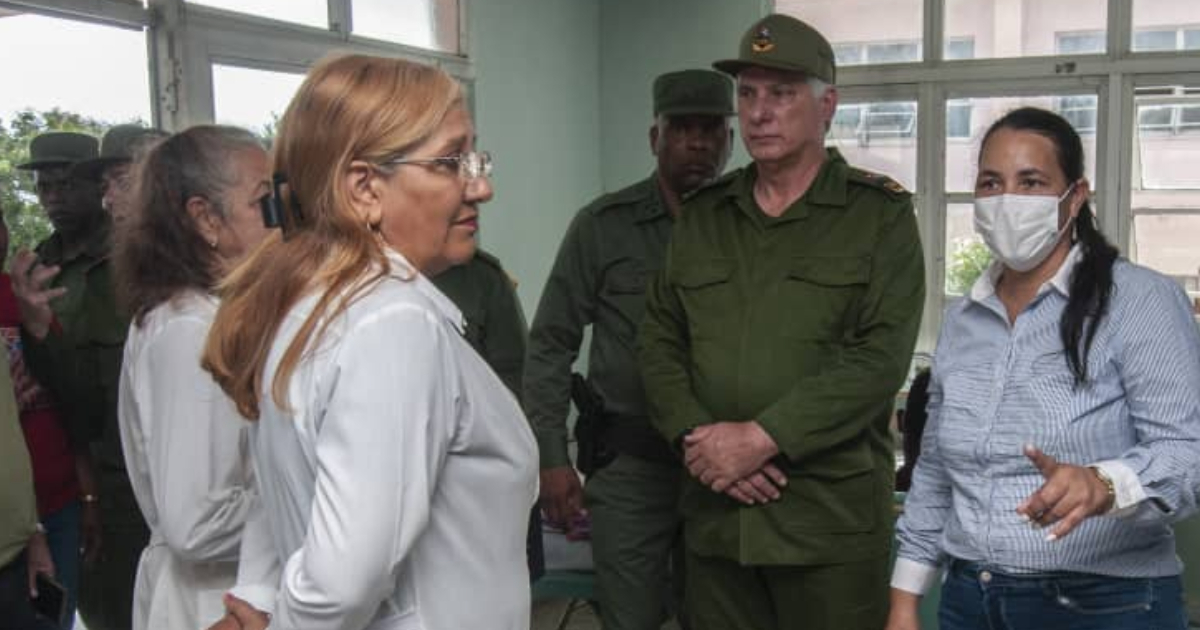
President Miguel Díaz-Canel has once again blamed the United States embargo on Cuba for the serious "shortages and difficulties" faced by the healthcare system on the Island.
In the opinion of Raúl Castro's successor, it makes no difference that his government invests 14 times more in tourism than in healthcare and social services, or that the money confiscated from doctors sent "on missions" abroad, under the pretext of redirecting those funds to public healthcare, is not seen in any hospital, at least not in those frequented by the people.
For Díaz-Canel, hell is other people. And that is why there is not a hint of self-criticism in the post he shared this Tuesday on the social network X (formerly Twitter), congratulating doctors on Latin American Medicine Day.
"On Latin American Medicine Day, our recognition goes to all healthcare workers, pride of the nation, for their dedication to the noblest of professions, amidst the shortages and challenges imposed by the blockade," wrote the dictator.
The responses to his tweet were quite harsh. "The basic salary of a specialist doctor is 5,560 pesos per month (16 dollars) and a pair of shoes in Cuba costs 15,000 pesos (45 dollars), and that's just one example. Just imagine eating, dressing, and paying rent," a user reproached him.
"Talibán, where did you get those photos? The ones I have of the hospitals in the town are very different. Tear those photos apart," pointed out another user, displaying updated images of the decline of Cuban healthcare, which contrast sharply with the idyllic hospital world shared by Díaz-Canel.
"We need to recognize the healthcare workers amidst the needs and difficulties because there is money for hospitals, but not for investment in hospitals," another user expressed.
There were even those who criticized Díaz-Canel for his granddaughters being born in a hospital reserved for leaders. "There, there were neither shortages nor difficulties, much less a blockade. You even blurred the background of the photo so no one would see the parallel world of the mafia clan, far removed from needs and shortages. Immoral," one said to him, amidst a sea of praises for Cuban medicine, likely coming from, among others, cyberclarias trained to praise the dictator.
The resistance of the Minsap
In line with Díaz-Canel, the Ministry of Public Health (Minsap) took the opportunity in their congratulations to doctors to discuss "resilience," overlooking instances of healthcare workers leaving their jobs "because one cannot live on that."
In the face of a shortage of medications, poor hygiene, and dilapidated facilities, the Minister of Health, José Ángel Portal, speaks of "challenging times," without mentioning the terrible health crisis the country is experiencing, plagued by contagious diseases like oropouche and dengue, which experts attribute to the unsanitary conditions of the streets, exacerbated by the lack of garbage collection.
The parade of synonyms didn't stop at "shortcomings and difficulties," "challenging times," or discussions of "resilience." Prime Minister Manuel Marrero added another synonym to describe the dire collapse of the Cuban healthcare system: "complexities."
This attempt to disguise reality is not new. Some of the most notable euphemisms include "Special Period," which refers to the severe economic crisis in Cuba during the 1990s following the fall of the Berlin Wall, and "Ordering Task," alluding to yet another failed attempt to unify currencies and stop the economic hemorrhage that Cuba is experiencing. The latter has resulted in the current wave of blackouts, which left the country in the dark for three days last October.
Filed under: